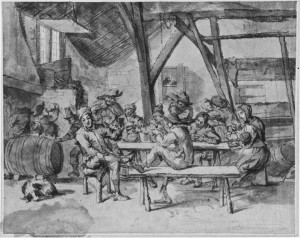The tavern scenes in Henry IV Part I are set in stark contrast to those that take place in the room’s of royalty and the battlefield. Hal’s lower class friends are not so concerned with the overthrowing of monarchs or war strategy. Pranks and hearty eating are much higher on the list of priorities at the tavern in Eastcheap. Why would Shakespeare include such debauchery in one of his histories praising the rise of the current royal bloodline? Harry’s time in the taverns is important in creating a more dynamic, more relatable depiction of England. It also creates a space removed from the drama of the royals and war where Harry and can temporarily escape to. Just as importantly, when Harry leaves the tavern, the heavy reality and role into which he was born can be fully appreciated.
Theodore Miles discusses the value of realism in settings of plays. He notes that the Boar’s-head tavern, this Eastcheap hangout, is not written to be a specific or particularly special tavern. It could be any typical tavern in sixteenth century London. By writing the tavern so, Shakespeare is celebrating the “Englishness” of the tavern scene in Renaissance and Elizabethan England. This “Englishness” is a term explored by Steven Earnshaw. Taverns are able to host the everyday and lower class people of England, to provide a look at the lifestyle of the majority rather than transfixing on the glamour of the upperclass. This is what Prince Harry desires to discover in hanging out in such unprincely places. His excitement over knowing slang is an embracing of a kind of “Englishness.” Shakespeare uses Prince Harry’s desire to be empathetic as a means of creating a richer, all inclusive portrait of England.
Earnshaw also refers to taverns as inducing an altered state. This is not just in reference to the alcohol served. Throughout the play the tavern serves as a space where Harry does not have to confront his reality and willingly lives in an altered state. As a prince he should be at his father’s side or on the battlefield fulfilling princely expectations. He instead declares that he acts as he does so that he can understand his people better and so he can shock everyone when he takes the crown and acts as a capable king. Reader’s should note that he makes this declaration at the tavern. When this plan is confronted by his father at the palace, it quickly falls apart and Harry decides to spring to action. Harry’s naivety can exist in the tavern. In his destined reality, however, he is not afforded such a luxury. By showcasing the change in Harry’s attitude in the royal and lowerclass scenes, Shakespeare has brought to light how different the priorities and struggles of the respective classes are. While in the tavern, the highest power Harry must answer to is Falstaff, and all crimes done against friends are willfully admitted to by the perpetrators. In the royal world, power is constantly being vied for by parties willing to spill blood and wrongdoings are often covered up with more blood.
The tavern scenes serve not only as means of including the lower class to create a richer history, but to display the dichotomy of the classes in England. Values at the tavern are very different from values in the royal palace or battlefield. Shakespeare explores this by having Harry be familiar with both.
Works Cited:
Miles, Theodore. “Place-Realism In A Group Of Caroline Plays.” Review of English Studies The Review of English Studies Os-XVIII.72 (1942): 428-40. Web.
Earnshaw, Steven. The Pub in Literature: England’s Altered State. Manchester: Manchester UP, 2000.

